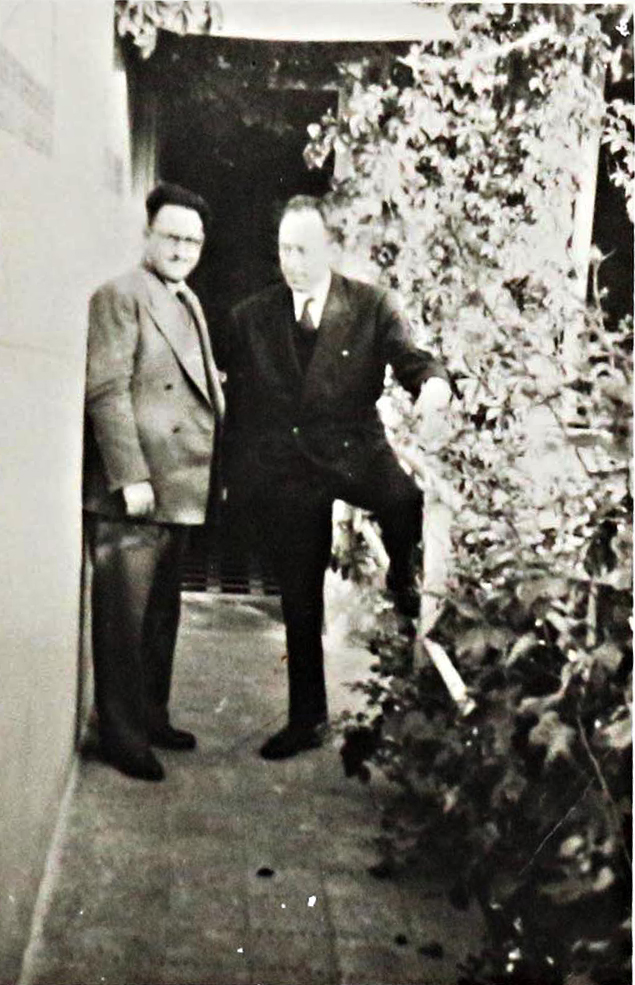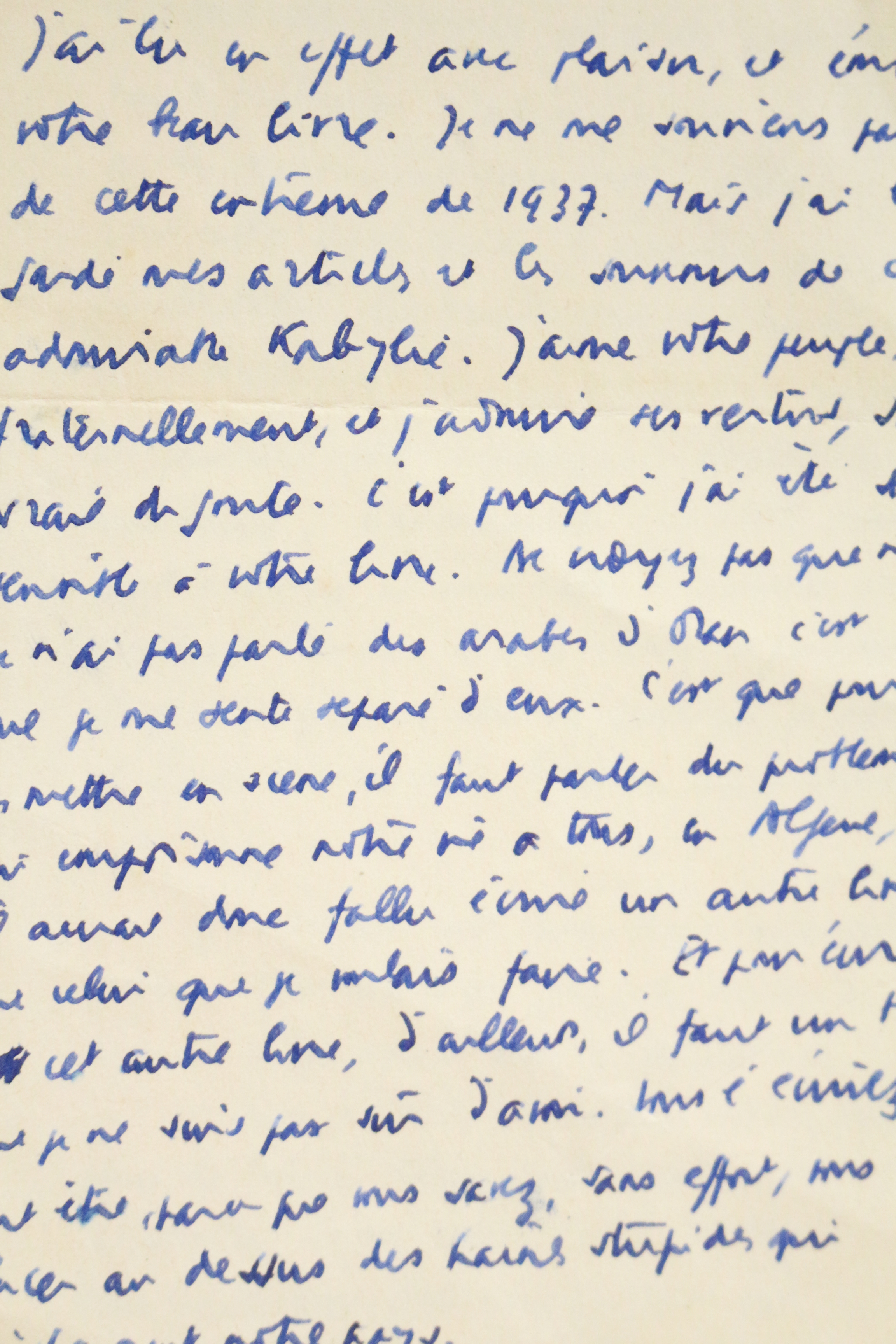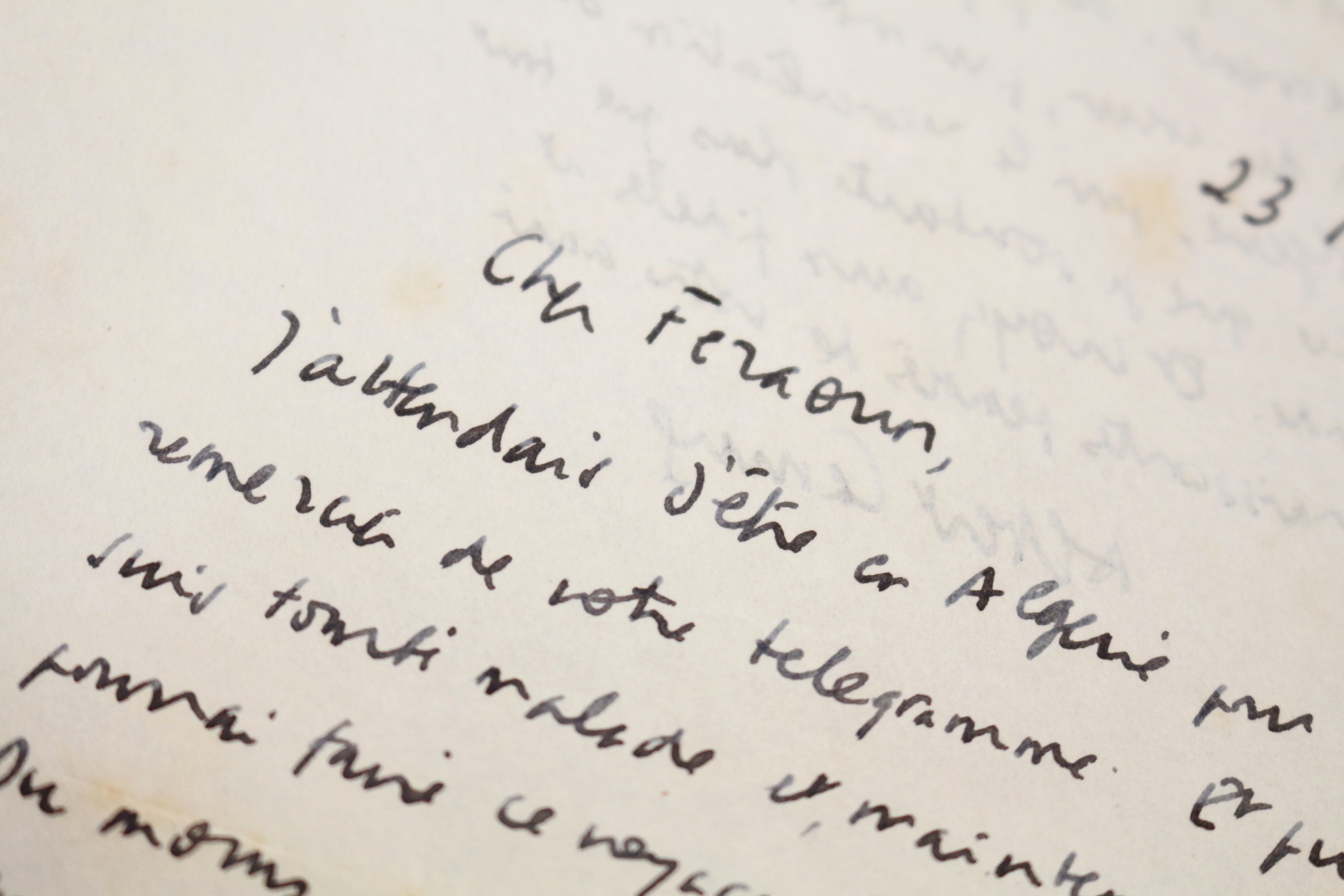Albert Camus and Mouloud Feraoun
a friendship that transcends intellectual and political differences
The epistolary exchange between Mouloud Feraoun and Albert Camus was known until today only through the publication of letters addressed to Camus by his alter ego Kabyle and published seven years after the disappearance of Feraoun. Only the first response from Camus has been published.
We now rediscover, through seven letters (three from Feraoun and four from Camus), a telegram, an open letter and an afternoon spent together in the streets of Algiers, the strong relationship that has been woven between the two intellectuals during these tenuous but intense exchanges.
In fact, apart from the telegram whose literal content is unknown to us, each exchange was essential, not only for the two men but for the understanding of the Franco-Algerian tragedy.

Between the first letter of thanks, in 1951, of a modest Kabyle teacher who aspires to writing, and the last open letter, in 1958, of the great Algerian writer who still claims to be a teacher, a friendship was born; but a paradoxical friendship, crossed by the conflagration of contrary passions and the nameless war that will break Camus and sacrifice Feraoun, assassinated by the OAS four days before the Evian agreements.
Feraoun's letters are fascinating, with great intellectual honesty and uncompromising vis-à-vis their prestigious recipient for whom the young Algerian writer, however, feels a great admiration. They testify to the awakening of the historical consciousness of the Algerian people and the premises of a new cultural identity affirming itself in the face of colonial violence.
Pioneer of the new French-speaking North African literature, Mouloud Feraoun will become one of the major writers of the nascent Algerian nation. His letters reflect his difficult and necessary liberation from the cultural and ideological domination of a France which he admires, and to which he owes his education and literary language. And Camus's luminous responses, which were previously unknown to us, turn out to be a great encouragement for the young author, far from the wait-and-see positions that have been unjustly accused of the Algerian writer.
Confronted with the violence of events, we know that Camus, pressed by all to take a stand, chooses silence, the only dignified attitude according to him in front of the unleashing of hatreds. Feraoun will recognize him himself:
"The fact that he has confined himself to this silence is a
mark of sympathy, if not more, for us. "

In 1951, three years before the war but six years after the massacres of Setif, Camus is reproached by this promising young writer the absence of the Arab community in his new novel, The Plague, as if "Oran [was] than a banal French prefecture. "Oh, this is not a reproach," says his interlocutor "I just thought that if there was not this gap between us, you would have known us better, you would have felt able to talk about us with the same generosity enjoyed by all others. "
It is more than a reproach, in reality, it is the laying bare of the white heart of Camus, despite his first poverty, his universalist thought, his involvement in the rights of the Arabs, his position as early as 1938 in favor of equality:
"The Kabyle clamoring for schools as they demand bread ... The Kabyles will have more schools, the day when we have removed the artificial barrier that separates European education from indigenous education, the day finally where on the benches of the same school, two peoples made to understand each other will begin to know each other. ".
In this first letter, Feraoun remembers this article of Algiers-Republican, but at the same time observes that its author is not above the colonists whom he denounces. He stays behind the fence and ignores the other one he does not know. There is in his novel on Algeria no Algerian community, no sharing of fate, even tragic. Sixty years later, Kamel Daoud will make the same observation about L'Etranger and expose the paradox of an exclusion novel that excludes himself.

First of all, by affirming his "brotherly" love for the Kabyle people, thus breaking away from colonial paternalism. But especially recognizing the lack of unity of Franco-Arab destiny: "to put them in scene [the Arabs of Oran], we must speak of the problem that plagues our lives for all, in Algeria; it would have been necessary to write another book than the one I wanted to do. ". Now, this admission of the impossibility of introducing an Arabic into his fictional world, without this type of character transforming fiction radically, is the answer to all the criticisms that will be made to him in the future. Camus is a writer of the archetype, not of social reality. Not only is it impotent to restore this story which is theirs: "It takes a talent that I am not sure to have", but it puts in the hands of "Arabic" the care to do. So from this first exchange, Camus exhorts his young interlocutor to become the writer of the Arab condition: "you will write it [...] because you know, without efforts, to place you above the stupid hatreds which dishonor our country" . We are in 1951 and Mouloud Feraoun is already a friend of Emmanuel Robles, while Gabriel Audisio wrote a very nice review of his first autobiographical novel The Son of the Poor. He is already part of the community of intellectuals, but what Camus reveals to him in this letter is that this community will not fill this "gap that widens stupidly".
In his letter of 1951, Feraoun confided to Camus:
"If I could one day express myself calmly, I should have to [...] your books that taught me to know myself and then to discover others".
Camus's letter adds to the need to tackle this task that neither he nor any other "black feet" can accomplish.
Six years pass before the next exchange, the Algerian war breaks out and men of good will can do nothing against the unleashing of "stupid hatreds".
Feraoun became the writer that Camus had foreseen. With a few others, he gave his people a voice, a story, a cultural legitimacy more powerful than any violence. But this story he engraved in the language of Camus, his brother of letters and blood who just received the Nobel Prize for Literature.
And this prize is closely linked to the Algerian history, which will not fail to reproach its detractors right and left. The Conservatives denounce a purely political act and an "interference in [the] internal affairs" of France by the celebration of a dangerous leftist (in Carrefour). The others, on the contrary, make fun of this apology of a "perfect little polite thinker", "philosopher of abstract freedom". It is not a question here of recalling all the proofs of commitment of Camus during these terrible years, nor the injustice of the reproaches addressed to him. If he is affected, Camus knows his friends of yesterday and his enemies forever and probably expects nothing better from them. He also knows that his report to Algeria partly motivates this prestigious award. However, if the reactions of the intellectuals of the metropolis do not surprise him, the violent silence of his Arab peers hurts him deeply. Only Feraoun, with whom he has had no correspondence for six years, telegraphs him immediately to congratulate him.
"You are the only Algerian writer who has thought that this news, the importance of which I do not exaggerate, could reach me at the moment when all my anguish is turned towards Algeria. "
"Touched to the heart", Camus addresses to this companion of misfortune a letter which marks the end of the illusions of peace and understanding between the two peoples. "I suppose others have consumed in themselves the separation we all suffer. And yet if, above injustices and crimes, a Franco-Arab community has existed, it is indeed the one we have formed, we Algerian writers, in the most perfect equality ".
The writer, who a year earlier tried to influence the Hungarian situation by calling for the union of intellectuals, discovers the absence of artistic community transcending "injustices and crimes." And this bitter conclusion, he does not address it to a simple member of the family, but the initiator of the Franco-Arab community, the first of the French-speaking Algerian writers and one of the last who, like him, militate "For the reconciliation in justice that [Camus] wants more than anything in the world. "
By using the expression "Algerian writers", Camus clearly breaks with the position of the colonialists who refuse to concede to the Arabs of Algeria the name of Algerians "what would have been to recognize the existence of an Algeria with no connection with the French , and whose "Europeans" would have been excluded " (Jacques Duquesne, History of Islam and Muslims in France from the Middle Ages to the present day). More than a proof of the commitment of Camus, which is still criticized today as a pretended fearful wait-and-see, this expression shared with Mouloud Feraoun is the witness of the third way that the two men are calling for, an Algeria reunited by its history and its common culture and not subservient to a segregationist power.
It is then that the friendship between the two men is born. Feraoun's long answer is marked by the tragic absurdity of their common situation but also, an incredible reversal of the situation, of the ascendancy that Feraoun then takes on his colleague. Faced with a helpless Camus, Feraoun brings him "this imperceptible smile" and promises him "that despite the high price and maybe because of that the men from us will manage to build this fraternal world that you always thought possible ".
A few months later, Camus, who was suffering from a terrible drought literary, finally tackling the work that tormented him since 1953, The First Man, an "educational novel" that will give a central role to the figure of the teacher.

The hours they spend together on April 12 are for both of them an oasis of fraternity in a desert of misunderstanding and resentment. In his diary, which he will keep until the day of his assassination by the OAS, Feraoun relates this afternoon out of time: "I felt with him as immediately at ease as with E. Robles. His position on events is what I assumed: nothing more human. His pity is immense for those who suffer but he knows alas that pity or love no longer has any power over the evil that kills, demolishes, who wants to make a clean sweep and create a new world from which timid, skeptics, and all the cowardly enemies of the new Truth or the Old Truth renewed by machine guns, contempt, and hatred. "
Shortly after his departure, Feraoun sent to Camus the photographs taken at home with his family and in his school alongside the students. Camus sends back to him one of the most moving letters on the Algerian tragedy for the only Algerian intellectual who will have understood and shared to the end the humanist position of Camus, at the cost of his life. The night that followed "this afternoon of friendship that [Camus] did not forget", the son of Robles killed himself in Algiers by manipulating the weapon of his father. For Camus, this absurd and terrible event is imbued with the Algerian curse and the words of his letter directly evoke his conversation reported by Feraoun: "I measured how powerless we could be in the face of certain misfortunes".
But what the author of the cycles of absurdity and revolt writes to Feraoun at the end of this afternoon is without doubt the most honest and perfect expression of the desperate struggle of the rebellious philosopher:
"I have begun to hope for a truer future, I mean a future where we will not be separated by injustice or justice."
History has liked to retain the position of Camus putting his mother before justice, what he teaches us here is that the Humanism he advocates is not a logic of priority of man over the ideological truth, but a truth defined by the yardstick of the human being, transcending the ideologies.
In his first letter, Feraoun hoped to find the necessary serenity to accomplish his literary mission: the recognition of the dignity of his people. Seven years later, in the midst of turmoil, Camus offers his friend the most beautiful legitimization of his work: "I also wanted to tell you that your calm, your courage (because the serenity in front of what we feel so strong is a form of courage) have done me more good in Algiers than a hundred other meetings. (...) your work is from that which one can read to the peasant of Tolstoy, (..) it does good, and it will do it because there is no hatred in you, and that your revolts are generous. "
The day after this letter, the putsch of Algiers will put an end to all the hopes of reconciliation.

"I feel infinitely closer to a Kabyle teacher than to a Parisian intellectual. "
It is more than probable that Camus recognized the true author of "Sources of our common misfortunes". But he also knows the huge risk that Feraoun takes by publishing an article that irritates both the FLN and the colonial power. So he thanked him with the same clandestinity, pretending to ignore the identity of the editor: "You will read I hope, (...) the letter of a Muslim teacher, to me addressed, and who told me much touched. ".
This letter from Camus is short and powerful like the last breath of the condemned man:
"I continue to hope for reconciliation - and this moment when our friendship will be the rule of all in Algeria." An almost mystical wish and a remembrance of the futile struggle uniting the two men in favor of a common recognition of the Other.
At the death of Camus, Feraoun gives him a poignant public homage by offering him in turn this sharing of their Algerian, against all odds: "It must be said that Camus was Algerian in the physical sense of the word. (...) We consider it an Algerian glory.
Faithful to their requirement of integrity and independence, Feraoun, like Camus before, refuses all the solicitations of the French State including the prestigious post of ambassador that offers him De Gaulle.
However he answers the call of his friend Germaine Tillion who founds the Educational Social Centers with a Franco-Arab team. "It is a matter of assuming the overwhelming responsibility that makes the" scholar "an educator, the clear-sighted a guide; the doctor a doctor and the man the brother of other men. ( Feraoun, The teacher of Bled - Bulletin of the Social Educational Centers No. 14, 1930)
More than twenty years after the discovery of Camus and his involvement in Algiers-Republican , Feraoun applies to the letter the principles advocated by this "brave guy" who, despite his youth and "his voice very weak", "was already concerned about fate of Muslim populations, [at the time when he, who was of the same age, 'exercised only to properly class. "(Feraoun," Sources of our common misfortunes, Letter to Albert Camus ").
On March 15, 1962, shortly after 11 am, an armed OAS commando entered the Center's premises in search of seven named persons, including Mouloud Feraoun. Six of their targets identified, the commando leads the victims to the corner of the building where two machine guns are waiting for them. Four days after the "assassination of Château-Royal", the Evian agreements will definitively seal the fate of Algeria, far from the fraternal aspirations of Camus and Feraoun and their " giant revolts ".







![[Meidosems] Sans titre. Encre et aquarelle](media/crop1-h-177-w-165-michaux_henri_sans-titre-encre-et-aquarelle_1946_edition-originale_5_64945.jpg)












 On-line help
On-line help